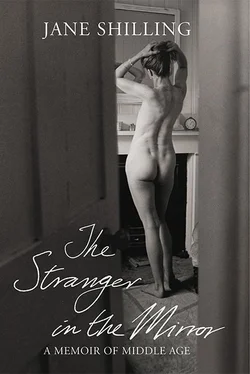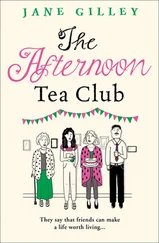And it is true that, with a robust constitution, a sensible diet and skincare regime, a fast metabolism, good stomach muscles and decent middling looks, it is possible to prolong the illusion of youth right up to the moment at which your body suddenly begins to deliver intimations of mortality – which, if you are cautious, may not be until the onset of the menopause, for which the average age in the UK is the early fifties.
I had not yet begun to experience symptoms of the menopause when I fell from my horse, and I was partly mistaken when I believed that I would never recover. Once again, the body performed its miracle of self-healing. After a week I stopped limping, after two I could get out of a chair without wincing, and the only sign that I’d harmed myself was the spectacular thundercloud bruise of purple, yellow and green that extended from my left hip halfway down my buttock.
All the same, it wasn’t nothing. By coincidence or not, it was the first of a series of events – small shifts of emphasis, minor bodily afflictions, changes of circumstance – that precipitated me out of the blithe, heedless relationship that I had had with my body ever since adolescence towards something more anxious and foreboding; a period of change and – however fiercely I resisted the idea – decay.
It was the accumulation of physical failings that I noticed first of all. Small, almost insignificant – the sort of thing you’d hesitate to bother the doctor with: a grating stiffness in the elbow and shoulder, a blurring of the vision. Childishly, I refused to acknowledge them, thinking that if I pretended for long enough that they weren’t there, in the end they would get bored and go away. When that didn’t work, I went to the optician, telling myself that it was about time I had a check-up anyway.
But the appointment didn’t go quite smoothly: something was bothering the optician. He fiddled patiently with different combinations of lenses, but none of his ingenious permutations could get us past the third line of letters on the chart, and even with my eventful ocular history that was worse than usual. ‘It almost looks as though you might have a cataract,’ he said, referring me to a consultant.
‘You’ve got a cataract,’ said the consultant. ‘Small, but in a very inconvenient place.’ She explained the treatment: entirely routine and straightforward, replacement lens, fixed focal length and then – sensing my dismayed resistance – added that I didn’t need to decide immediately. I could wait for surgery until the inconvenience became intolerable. (In about thirty years’ time, thought I, with relief – my 80-year-old aunt had just undergone a successful cataract operation.) In about two years’ time, said the consultant.
Trivial as they were, these small malfunctions of the body bit deep into my sense of myself. ‘Considering how common illness is,’ wrote Virginia Woolf in her essay, ‘On Being Ill’, ‘how tremendous the spiritual change that it brings, how astonishing, when the lights of health go down, the undiscovered countries that are then disclosed… when we think of this… it becomes strange indeed that illness has not taken its place with love and battle and jealousy among the prime themes of literature.’
As a peaky child, prone to migraines and fainting fits, I had relished my occasional excursions into the undiscovered countries of mild ill health with their attendant privileges: days off school spent reading in bed, punctuated by the arrival of special little meals on a tray and the opportunity to amuse myself with the glittering contents of my mother’s jewel-box.
I had observed, also, the adroit use my grandmother Shilling made of her reputation for being ‘delicate’. Well schooled in fairy stories, I knew that a fragile constitution was the infallible sign of noble birth. It didn’t occur to me that her unspecified malaise might be a form of mute protest.
Years later, long after I had grown out of my childhood sickliness and into the kind of grimly splendid constitution essential for single mothers and the self-employed, I did once fall seriously ill. Disagreeable and wildly inconvenient though it was to find myself on a drip in a hospital bed, there was – once the drugs had begun to work – a kind of delicious fecklessness about this half-illicit flight from the duties of health into the realm of sickness that reminded me of those childhood illnesses.
But that dramatic lapse from health was nothing like these furtive degradations. In her book, Fracture , the sociologist Ann Oakley, describing a fall when she was in her mid-fifties that damaged irreparably the nerves of her right hand, notes the paradox that, ‘while the body is the most abiding presence in our lives, the main feature of this presence is actually absence. Indeed, one definition of health is not to feel one’s body… Ageing,’ she adds, ‘is a time in our lives when it’s hard to pretend that we are in any sense separate from our bodies.’
Exasperated by my own growing estrangement from the body that had served me so unobtrusively until now, I was alarmed by the proliferation of small mechanical failures: after the grating and creaking of the joints and the dimming of vision there came a treacherous imperiousness of the bladder.
Relations between me and my bladder had always been fraught. Aged three, I sat in my white poplin frock with matching knickers and a pink grosgrain belt at Miss Thompsett’s ballet class and, too shy to ask for the lavatory, made a warm, shaming puddle on the floor. When my son was born, I noted with misgiving that among the possible consequences of pregnancy was post-partum incontinence. I thought myself lucky to avoid it, and it was without surprise, although with acute dismay, that I found myself at 47, hopping urgently from foot to foot as I had four decades ago as a little girl waiting for the school bus in cold weather.
I mentioned the clamorous bladder to the practice nurse when I went for a routine check-up. ‘It’s your age,’ she said, briefly. ‘Any hot flushes?’ I took to visualising my bladder as a dried-up horse-chestnut husk during the final agonising moments of the hour-long, traffic-choked, daily school run. It helped a bit. If my job had been one in which it was impossible to make an urgent dash to the loo the instant one became necessary; if, that is to say, I had worked as a traffic warden, waitress, bus driver, police-woman, sales assistant, surgeon, lawyer, teacher, banker, nurse or businesswoman – indeed, in almost any occupation other than that of home-based freelance writer – the quality of my working life would have become utterly wretched at this point.
An extraordinary degree of self-possession is required for a middle-aged woman to explain, several times a day to a younger colleague (even a sympathetic one), a criminal whom she is in the process of arresting, or a class of scornful schoolchildren that she has to go to the loo, now, this second, no, sorry, can’t wait even for an instant. Even if one contrived to muster that degree of self-possession (and managed to keep it intact, day after day, week after week), the effect on one’s authority and professional standing could hardly be other than ruinous.
Incontinence is something we are encouraged, as infants, to relinquish as soon as possible. The moment at which we gain mastery over our excretory functions marks the transition from impotent babyhood to autonomous personhood. To lose that mastery (and just when one might expect to be reaching the height of one’s success and responsibility at work) is not merely infantilising, but un-personing. One ceases to be who one was, and becomes the 24-hour-a-day attendant of a querulous bladder.
On a practical level, I took to organising my life outside the house as a point-to-point between handy loos. Bond Street and Piccadilly could be negotiated without anxiety because of the plethora of conveniences along the route – the stately Victorian thrones of the London Library, the Royal Academy’s design-conscious essay in inconvenience: blond wood, slate floors, always with a long queue of desperately chattering women snaking back into the entrance hall; Fenwick’s chintzy cubicles with white-coated attendant and gilt-and-glass scent bottles – all within easy dashing distance, while High Street Kensington was a desert without oases, to be avoided at all costs. ‘You’d better go now, while you’ve got the chance,’ I used to say bossily to my toddler son. Now it was myself that I was chivvying.
Читать дальше












